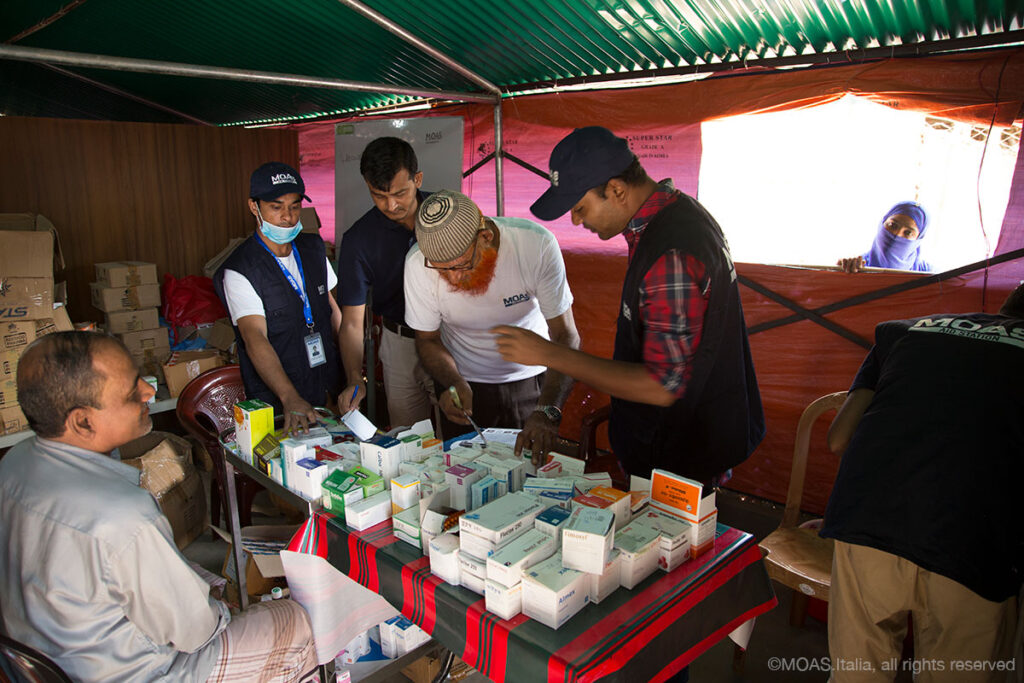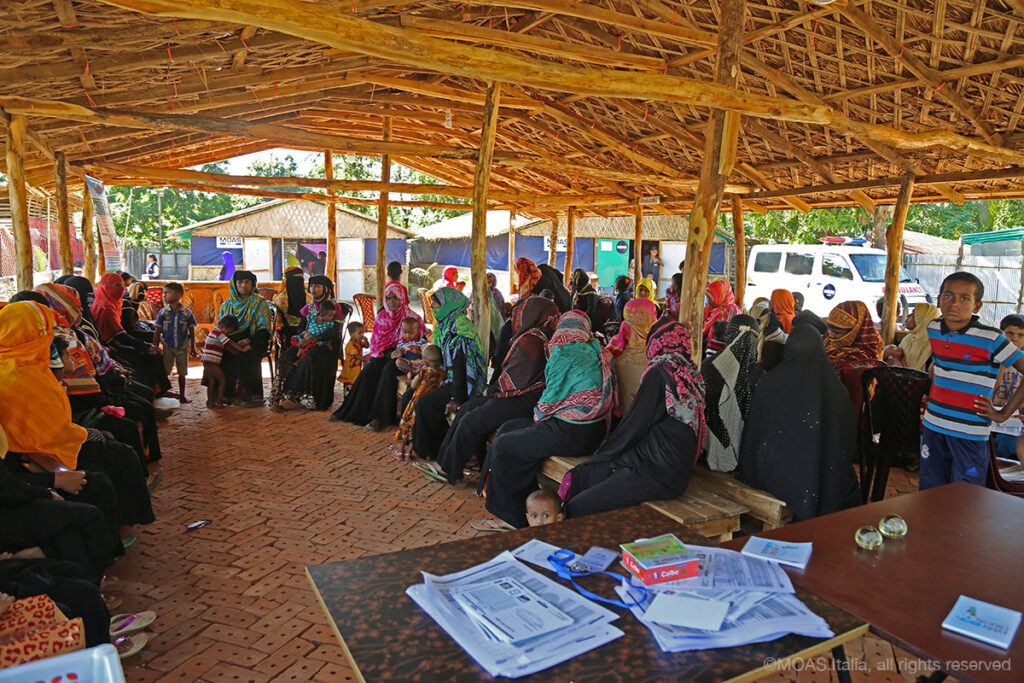Hello and welcome to MOAS…
Last time, we were taking a more general take on the wider Aid mission that MOAS is conducting in Bangladesh, across land and sea.
Now we’re going to look more closely at the land-based Aid Stations.
In two short months MOAS has managed to setup two functioning hospitals, one in Shamlapur, the other at Unchiprang.
Their purpose is to help the local Bangladeshi population and the Rohingya people who’ve fled violence in Myanmar.
It’s around half nine in the morning and the main road through Shamlapur is already buzzing. Cars and bikes beep their horns as they contend with pedestrians for space on the road.
Across the road is the Shamlapur Aid Station, its open for another day.
The registration area is the first stop for those visiting the Aid Station.
Sat around are a mixture of people from the local Bangladeshi and new Rohingya community.
Shamlapur alone has treated almost 6,000 of these people, the majority of them women and babies.
The registration is thorough. New visitors are asked to provide their details before they go through the process of Triage.
‘I’m Md. Nazmul Haque (pron Hack) Nannu. I’m a medical assistant and I write down all the names and ages of the patients. Here we work with old and young patients and we take their weight. We then give them a serial number and send them inside.’
At the Triage stage patients are physically examined before having their medical needs assessed from low to high.
Among the tests conducted by the nurses is to measure pulse, temperature and blood pressure.
‘I am Akramuzzaman Shaheen, and I have a BSC in Nursing from the Bangladesh Nursing Council. Under the advice of the Doctor we treat the patient. My role involves administering antibiotic, IV fluids and dressings. I also measure the blood pressure, blood sugar of patients and for some we do nebulizations. We also treat patients with breathing problems.’
Language barriers can be a challenge when providing medical treatment.
Over a third of those treated at Shamlapur since its opening have been Rohingya.
That’s where the cultural mediators play a vital role in translating for the medical team.
‘My name is Mohammad Zubayer. I am working here as a cultural mediator. Our Doctor’s don’t understand the language of the people coming from Myanmar so part of my job is to translate for the doctor. For patients coming to the station we have to give them serial numbers and direct them to the doctor. We essentially have to guide the patient until they receive medicine and leave the hospital. I feel good working here because the environment is good and we provide all kinds of facilities.’

The Aid Stations are staffed with a diverse team of medical professionals to treat primary and secondary conditions like injuries, illness and some life-threatening conditions.
160 cases of infection or disease have been recorded since the station opened in September.
‘I’ve been working with MOAS here since 10th November. My responsibility here is to visit all of the patients. Here some of the patients come with normal symptoms like a cough, common cold and fever and others with diarrhoea. Most of the patients are coming with skin disease. In this area skin disease is very common because it is over populated. We find most of the patients have skin disease and diarrhoea. Other patients come with hypertension, diabetes, stroke or those who are unconscious, these patient s will also come here.’
It’s good here because the scope of the work is high. In the Aid station we have spaces to do dressings and minor surgery, we deal with injuries and we also have a delivery room for women who go into labour. There is also a huge supply of medicine so we can prescribe all different types. We can also provide tertiary levels of treatment.
Patients newly diagnosed with hypertension or newly diagnosed with diabetes we can treat them with our resources. Our capability is more than sufficient in this crisis area I think.’
Once patients have been consulted by one of the doctors over their condition, they are then either taken for immediate medical treatment or directed to the Pharmacy.
It’s here that a range drugs can be prescribed for illnesses like colds and for those recovering from surgery.
My name is Delower Hossain and my job is to give medicine to patients according to their prescription. I give them clear explanations about their medicine…like, if the dose is for empty stomach, they have to take it on an empty stomach…. and if they have to have a meal before it.. you get the idea. If a doctor tells them to come again after a week, then I have to tell them. For patients who have injuries or surgery we have to tell them to come the following week for dressing. Here poor people can get treatment. I feel proud when I can serve the helpless people who are coming from a different country.
Should there be cases where patients have life threatening conditions that can’t be treated in the Aid Station, an ambulance is on call to transport patients to the local hospital.
My name is Mohammad Abul Hossain and I drive the ambulance for MOAS. I clean and look after the ambulance. I generally stay on standby, so that if doctor’s call me I can get to work…. A few day’s back, I took an old man to hospital. We gave him Oxygen and then he was admitted to Sadar Hospital in Cox’s Bazar. Once he was comfortable I came back to the hospital.
The Aid Station wouldn’t function properly without its logistician.
It happens.. medical items, even the smallest of things will run out and it’s vital that they are replaced.
Mohammed Nizamuddin has this job in Shamlapur.
My job is to order or deliver all the medicine and products related with our medical work here. One thing I admire about MOAS is the quality. They maintain it. When we go to the market, we are instructed on buying the best things. We purchase medicine from the top five companies in Bangladesh. This is the same for our medical equipment and the instruments used by our doctors. There was a female patient, who came here to deliver her baby and we didn’t have enough surgical gloves. So, what I did was take the ambulance and collect them from Cox’s Bazar. We successfully made the delivery. We do our best to provide the services.
Managing the daily operation of the Aid Station and its 600 local visitors, and medical team is the Station Manager.
It’s a tough job, one that requires problem solving and the ability to jump in when there’s a crisis.
That’s Shah Kamal..
My name is Shah Kamal and I’m the Station Manager of MOAS Aid Station one. I monitor all the activities here. If there are problems with registration, I have to solve them. If doctor’s have any kind of problems, I solve them. if there are any emergency patients I take care them. If the pharmacy is low on medicine I let the logisticians know. I also arrange the transportation for the Doctors and Nurses leaving the compound. When the security guard comes at the end of the day, I head home.
It’s dusk in Shamlapur and the Aid Station closes its doors to another day of assisting the community.
Tomorrow brings another set of medical cases and stories.
If you liked this Podcast don’t forget to hit like, comment and subscribe for more Podcasts from us.
You can follow us on our social media.
Check out our latest updates on Facebook, Twitter, Instagram, Youtube and AudioBoom… or you can donate to help us provide urgent medical assistance to Rohingya refugees.
From all of us here at MOAS: goodbye.

